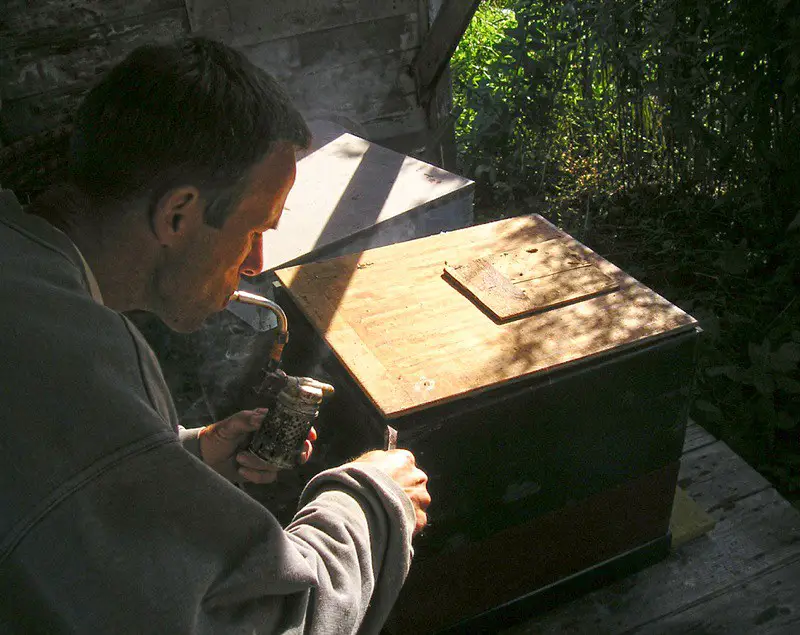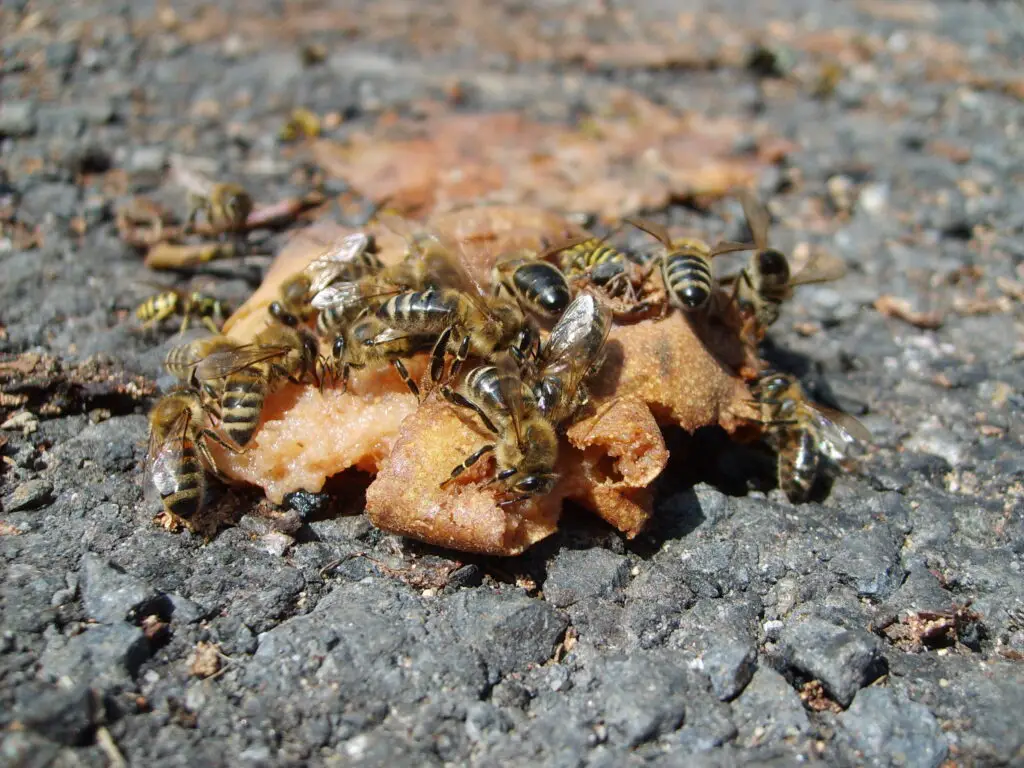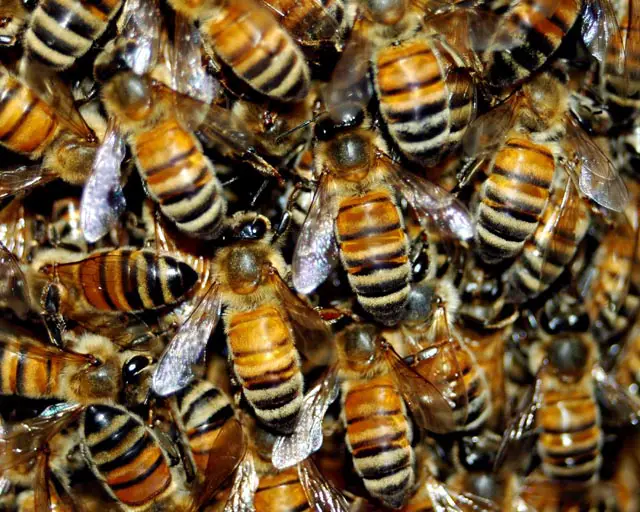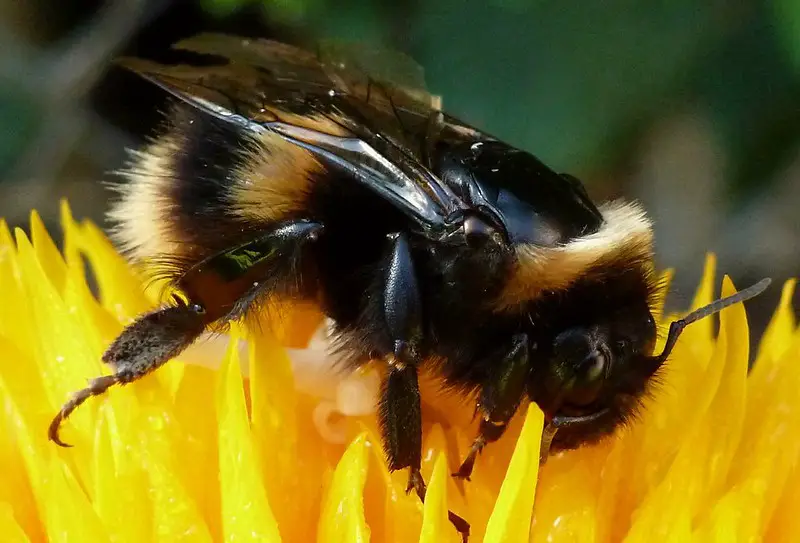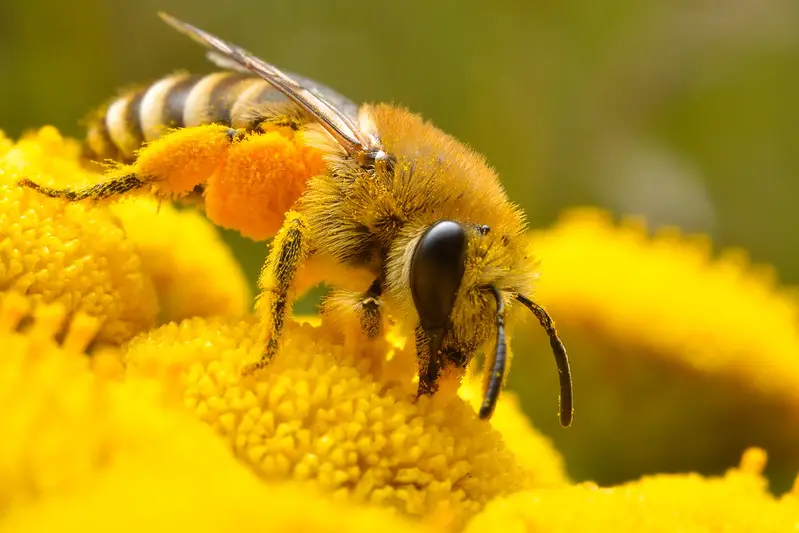Make bees go away by planting bee repelling plants
There is a simple solution to keep bees away. Plant plants that naturally keep bees away. Bees are attracted to certain plants to get nectar. But, with a bit of research, you can strategically plant the types of plants that will repel bees from your yard.
You can plant cucumbers to get rid of wasps and bees from your garden. Use cucumber peels in the areas with bee activity. Acidic peels of cucumber repel Bees. It’s a great natural bee and wasp repellent.
The following are also safe, natural bee repellent plants:
- Pennyroyal,
- Neem,
- Mint
- Cloves
- Eucalyptus, and
- Citronella all have strong smells that deter bees.
Among the few flower-producing natural bee repellents are red marigolds and germaniums.
The smell of garlic deters bees, so spraying garlic powder around their nests or other places they frequent will scare them away. As a result, they often avoid this area, but directly applying the powder to the bees can prove fatal.
Make bees go away with a citronella candle
Lemongrass candles will not hurt the bees but will scare them away and help prevent bad odors. Likewise, using citronella candles or lanterns over large areas will scare away bees. Another great way to scare off bees is to simply plant bee repellents in your garden or containers near your home.
Make bees go away with mothballs
Another alternative method of repelling bees is to sprinkle cinnamon on the hive for at least a week if you have found a hive of honey bees and want them to find a new home without harming them. Oddly enough, bees hate the smell of cinnamon and mothballs, so you can place them in places where the bees can build a nest.
Make bees goa away with cinnamon
Did you know that cinnamon will make bees go away? Yes, cinnamon is a natural bee repellent. Use cinnamon to repel bees in powder or essential oil form. When you keep it near areas bees hide, cinnamon will keep them away. Bees hate cinnamon and cinnamon powder is an excellent bee repellent. If you see bees crawling and hiding into holes and openings around your home, sprinkle some cinnamon powder on the area. Make sure there is no added sugar in the cinnamon you use as a bee repellent. Sugar will have the opposite effect of cinnamon and it will attract bees instead of making them go away. Although cinnamon is a great way to get rid of bees, it’s not a permanent solution.
You can finally make a DIY bee spray using a drop of peppermint oil, tea tree oil or cinnamon oil (or all three) with a cup of unscented baby shampoo. If bees are hard to get rid of, make a solution of garlic and vinegar to spray the entire house with water and vinegar. Mix equal parts of a spray bottle with water and vinegar to get rid of bees and get rid of worms and mushroom flies.
Make bees go away with soap and water
Resolving your bee problem with soap and water may sound tempting because it’s so easy. The materials are readily available in any home. Unfortunately, this method of bee control is also one of the most dangerous to perform.
If you don’t have protective gear, you should not attempt to make bees go away with soap and water. When you perform this bee control technique, the bees will come at you. And if you don’t have gear protecting you from a bee attack, you could be in danger. Even if you have the appropriate protective gear, make sure that you have a backup escape plan. When working with bees, it’s good to have a plan b. Those people who are allergic to bee stings should never attempt to get rid of bees with this technique.
Soapy water will make bees go away because the soap forms a waxy coating on the bees and their hive. In addition, the soapy water solution cuts the air supply of the hive and impairs the bees’ ability to move through the air.
People often associate bee pest control with harmful insecticides, but you can use several natural methods: You can use various techniques to naturally scare bees away from your terrace, porch, patio, or home. Without killing or removing bees, a good way to keep bees away from your home is to grow bee repellent plants at home, including mint and lemongrass.
One of the easiest ways to scare away bees is to sprinkle a generous amount of garlic powder in areas where bees gather, but they will become aggressive as they fidget, so it’s best to go back inside again – bees have a strong sense of smell – and we all know that garlic has a very strong smell.
Mix water and vinegar evenly in a spray bottle, shake and spray the mixture around the nest when the bees sleep and around the yard where you usually see a lot of bees. Next, mix equal amounts of water and vinegar in a spray bottle, shake and stir in the nest when the bees sleep, at night and around plants where you usually see a lot of bees. This will kill the bees and remove any dead bees.
You can place items with these heavy, oily smells on your porch or near the beehive to encourage the bees to disperse. You can easily make a citrus spray in your home to keep bees from entering your home—chopped garlic. If you chop the garlic and soak it for a few days in water, it will be a great bee repellent if you put it around plants or in places where people hang out in the open air.
Most bees will not stick if they smell like heavy oil like cedar, cloves, eucalyptus or lemongrass. To use mothballs, hang them near the bee’s nest or nests to prevent bees from returning eventually. In addition, the smell will prevent the bees from returning to your garden. You can also place mothballs in old nylon or cheesecloth and hang them near the nest.
Smoking is also a natural method of getting rid of the bee nest on the roof, and it is also an effective and easy way to keep bees away from hives. If you are allergic to bees, see a bee removal professional. Smoke is probably the most effective way to keep bees away from the house and keep them away. However, having bees in your home can cause problems as their stings can be dangerous for people with severe allergies.
The populations of certain types of bees (e.g., honey bees) are in a quandary, and there are safe ways to remove them professionally. Here are five natural ways to get rid of bees, including three that won’t harm them. Hence, if you see bees on your farm, you must find a way to get rid of the beneficial honey bees without killing them.
Using insecticides to kill bumblebees, especially bees, is not recommended because they are beneficial insects. However, if your family is allergic, it is especially important to get rid of bees and their hives because even a bite can threaten their lives.
If you block the entrance to the bees, they will chew and can enter the living areas of your home, which will also be a problem as these insects will have fewer nesting areas. If you notice that bees have set a bench on your siding, under your deck or in a tree too close to your home, moving the hive may be the best option. Some honey bee collectors are away from the hive during the summer.
The populations of certain types of bees (e.g., honey bees) are in a problem, and there are safe ways to remove them professionally; therefore, it is not advisable to use pesticides to get rid of them if you spot them on your farm, because they are beneficial insects.
A great way to keep bees away from your home without killing or removing them is to grow bee-repellent plants around your home. Another great way to scare off bees is to simply plant repellent plants in your garden or near your home, including mint and lemongrass. Oddly enough, bees hate the smell of cinnamon and mothballs, so you can place them in places where the bees can build a nest.
If bees are difficult to get rid of, ponder making a solution of garlic and vinegar to sprinkle around your house. Use a vinegar spray, mix equal parts of a spray bottle with water and vinegar to get rid of the ground bees. You can also spray the vinegar mixture on the bees instead of putting it in different places and waiting for bees to arrive.
Be sure to mix equal amounts of water and vinegar in a spray bottle, shaking and stirring at night and around plants where many bees are usually seen. This mixture will kill bees, so be sure to remove all dead bees. If you find a swarm of bees and want them to find a new home without harming them, sprinkle cinnamon on the hive for about a week.
Use candles or lanterns near the nest or around the house or garden to encourage bees to move, and use citronella candles or lanterns over large areas will bees to move away. In addition, you can use various techniques to naturally scare bees away from your patio, porch, patio or home.
Bee nests may be wiped with chemicals and sprayed with bees nudging them is not the best solution – especially if you have other items in your home that the spray could damage – you will chew them and enter the living areas of your home, which is another problem – Reducing litter in your yard can also scare away bees as these insects will have fewer nesting areas – Once the jars are strategically placed in your garden as well as around your home, the be
Then pour this solution into a spray bottle and use it around the hive and where you feel the bees fly, shake and spray evenly in a spray bottle around the nest at night and around the yard where you usually see lots of bees, and then mix one tablespoon of the extract with water and keep them away from you. However, this is a popular spot for bees (if you’re not a bee-keeper ).
The smell of garlic deters Bees, so sprinkling garlic powder around their nests or other places they often visit can scare them away. They will become aggressive as they slip away, so it’s best to go back inside. Peppermint Bees try to avoid the smell of peppermint in places and plants they frequent.
A large number of bees gathering on a tree in your yard or around your home can be disturbing, especially if they form a hive in your home, and they can remove the entire hive to take with you. Bees are beneficial insects in the ecosystem, but they can be dangerous when building nests near your home or workplace. If your hornworms are useful bees, they will use bait traps to lure the colony into the hive.
Some honey bee collectors also spend the night away from the hive during the summer months, so bees may gather around the entrance after the bees and combs have removed the combs. Peppermint oil can kill almost any insect, but boiling water and soap can kill the bees on their own.
